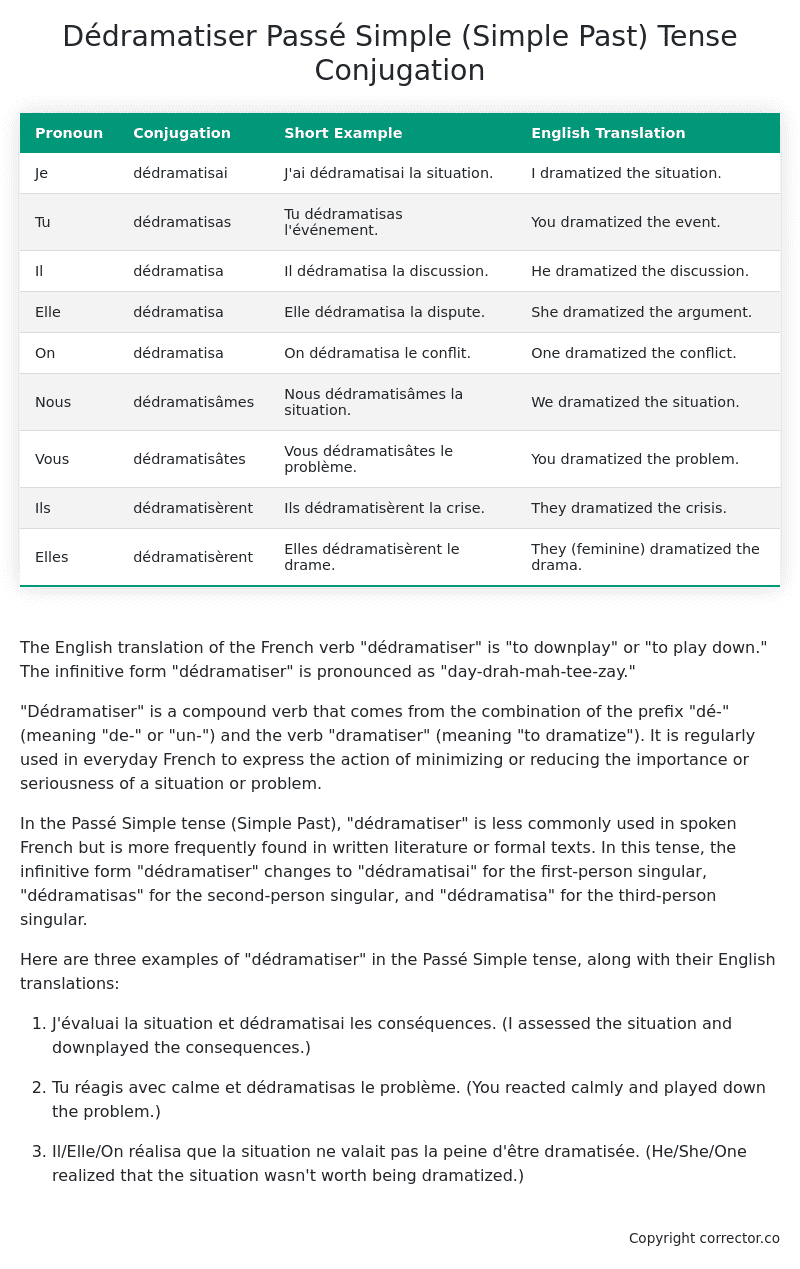Passé Simple (Simple Past) Tense Conjugation of the French Verb dédramatiser
Introduction to the verb dédramatiser
The English translation of the French verb “dédramatiser” is “to downplay” or “to play down.” The infinitive form “dédramatiser” is pronounced as “day-drah-mah-tee-zay.”
“Dédramatiser” is a compound verb that comes from the combination of the prefix “dé-” (meaning “de-” or “un-“) and the verb “dramatiser” (meaning “to dramatize”). It is regularly used in everyday French to express the action of minimizing or reducing the importance or seriousness of a situation or problem.
In the Passé Simple tense (Simple Past), “dédramatiser” is less commonly used in spoken French but is more frequently found in written literature or formal texts. In this tense, the infinitive form “dédramatiser” changes to “dédramatisai” for the first-person singular, “dédramatisas” for the second-person singular, and “dédramatisa” for the third-person singular.
Here are three examples of “dédramatiser” in the Passé Simple tense, along with their English translations:
-
J’évaluai la situation et dédramatisai les conséquences.
(I assessed the situation and downplayed the consequences.) -
Tu réagis avec calme et dédramatisas le problème.
(You reacted calmly and played down the problem.) -
Il/Elle/On réalisa que la situation ne valait pas la peine d’être dramatisée.
(He/She/One realized that the situation wasn’t worth being dramatized.)
Table of the Passé Simple (Simple Past) Tense Conjugation of dédramatiser
| Pronoun | Conjugation | Short Example | English Translation |
|---|---|---|---|
| Je | dédramatisai | J’ai dédramatisai la situation. | I dramatized the situation. |
| Tu | dédramatisas | Tu dédramatisas l’événement. | You dramatized the event. |
| Il | dédramatisa | Il dédramatisa la discussion. | He dramatized the discussion. |
| Elle | dédramatisa | Elle dédramatisa la dispute. | She dramatized the argument. |
| On | dédramatisa | On dédramatisa le conflit. | One dramatized the conflict. |
| Nous | dédramatisâmes | Nous dédramatisâmes la situation. | We dramatized the situation. |
| Vous | dédramatisâtes | Vous dédramatisâtes le problème. | You dramatized the problem. |
| Ils | dédramatisèrent | Ils dédramatisèrent la crise. | They dramatized the crisis. |
| Elles | dédramatisèrent | Elles dédramatisèrent le drame. | They (feminine) dramatized the drama. |
Other Conjugations for Dédramatiser.
Le Present (Present Tense) Conjugation of the French Verb dédramatiser
Imparfait (Imperfect) Tense Conjugation of the French Verb dédramatiser
Passé Simple (Simple Past) Tense Conjugation of the French Verb dédramatiser (You’re reading it right now!)
Passé Composé (Present Perfect) Tense Conjugation of the French Verb dédramatiser
Futur Simple (Simple Future) Tense Conjugation of the French Verb dédramatiser
Futur Proche (Near Future) Tense Conjugation of the French Verb dédramatiser
Plus-que-parfait (Pluperfect) Tense Conjugation of the French Verb dédramatiser
Passé Antérieur (Past Anterior) Tense Conjugation of the French Verb dédramatiser
Futur Antérieur (Future Anterior) Tense Conjugation of the French Verb dédramatiser
Subjonctif Présent (Subjunctive Present) Tense Conjugation of the French Verb dédramatiser
Subjonctif Passé (Subjunctive Past) Tense Conjugation of the French Verb dédramatiser
Subjonctif Imparfait (Subjunctive Imperfect) Tense Conjugation of the French Verb dédramatiser
Conditionnel Présent (Conditional Present) Tense Conjugation of the French Verb dédramatiser
Conditionnel Passé (Conditional Past) Tense Conjugation of the French Verb dédramatiser
Conditionnel Passé II (Conditional Past II) Tense Conjugation of the French Verb dédramatiser
L’impératif Présent (Imperative Present) Tense Conjugation of the French Verb dédramatiser
L’impératif Passé (Imperative Past) Tense Conjugation of the French Verb dédramatiser
L’infinitif Présent (Infinitive Present) Tense Conjugation of the French Verb dédramatiser
L’infinitif Passé (Infinitive Past) Tense Conjugation of the French Verb dédramatiser
Le Participe Présent (Present Participle) Tense Conjugation of the French Verb dédramatiser
Le Participe Passé (Past Participle) Tense Conjugation of the French Verb dédramatiser
Struggling with French verbs or the language in general? Why not use our free French Grammar Checker – no registration required!
Get a FREE Download Study Sheet of this Conjugation 🔥
Simply right click the image below, click “save image” and get your free reference for the dédramatiser Passé Simple tense conjugation!

Dédramatiser – About the French Passé Simple (Simple Past) Tense
Formation
Usage
Narration
Historical Context
Interactions with other tenses
Passé Composé
Imparfait
Conditional and Subjunctive
Summary
I hope you enjoyed this article on the verb dédramatiser. Still in a learning mood? Check out another TOTALLY random French verb conjugation!


